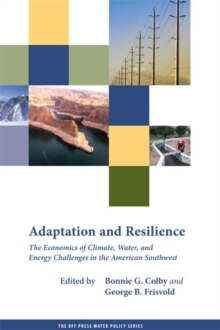
Water Diplomacy : A Negotiated Approach to Managing Complex Water Networks PDF
by Shafiqul (Tufts University, USA) Islam, Lawrence E. Susskind
Part of the RFF Press Water Policy Series series
Description
Water is the resource that will determine the wealth, welfare, and stability of many countries in the twenty-first century.
This book offers a new approach to managing water that will overcome the conflicts that emerge when the interactions among natural, societal, and political forces are overlooked.
At the heart of these conflicts are complex water networks.
In managing them, science alone is insufficient and so is policy-making that doesn't take science into account.
Solutions will only emerge if a negotiated or diplomatic approach that blends science, policy, and politics is used to manage water networks.
The authors show how open and constantly changing water networks can be managed successfully using collaborative adaptive techniques to build informed agreements among disciplinary experts, water users with conflicting interests, and governmental bodies with countervailing claims.
Shafiqul Islam is an engineer with over twenty-five years of practical experience in addressing water issues.
Lawrence Susskind is founder of MIT's Environmental Policy and Planning Program and a leader of the Program on Negotiation at Harvard Law School.
Together they have developed a text that is relevant for students and experienced professionals working in a variety of engineering, science, and applied social science fields.
They show how new thinking about water conflict can replace the zero-sum battles that pit experts, politicians, and stakeholders against each other in counter-productive ways.
Their volume not only presents the key elements of a theory of water diplomacy; it includes excerpts and commentary from more than two dozen seminal readings as well as practice exercises that challenge readers to apply what they have learned.
Information
-
Download - Immediately Available
- Format:PDF
- Pages:352 pages, 5 Tables, black and white
- Publisher:Taylor & Francis Ltd
- Publication Date:26/07/2012
- Category:
- ISBN:9781136186578
Information
-
Download - Immediately Available
- Format:PDF
- Pages:352 pages, 5 Tables, black and white
- Publisher:Taylor & Francis Ltd
- Publication Date:26/07/2012
- Category:
- ISBN:9781136186578










